The chefs using TikTok to reinvent their careers
- Published
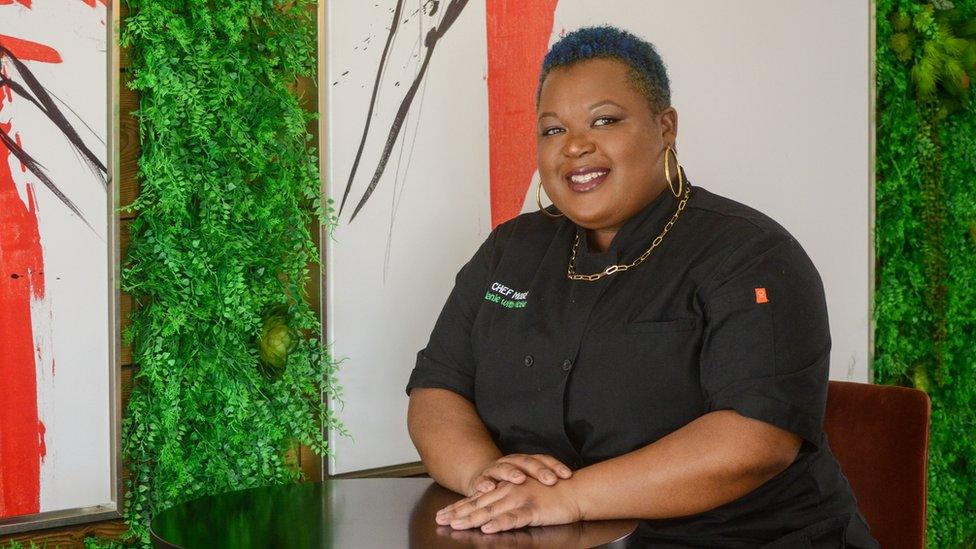
Thara Moise says that the joy of being a private chef is that she is her own boss
The Covid crisis saw thousands of restaurants temporarily or permanently close their doors, prompting some chefs to turn to TikTok to reinvent themselves.
When Thara Moise was furloughed from her job leading a busy kitchen, she decided to relaunch her career as a private chef.
She ditched working in restaurants and company canteens, and instead become her own boss, available to hire for private events.
Ms Moise says she knew that she had to make herself much better known to potential customers, and so came up with a strategy. "I had to make sure I was going to 'blow up' on social media," she says.
So, the 29-year-old from Philadelphia started to upload videos of her cooking and recipes to TikTok. Being her engaging self she started to build-up a significant following. Two years later, and her account - @chefmoise_, external - now has more than 558,000 followers, and her videos have gained more than 13 million likes.
"I couldn't believe I reached 500,000 followers as fast as I did," says Ms Moise, who is now highly sought after as a private caterer.
She adds that she doesn't miss the restaurant world one bit, and that as a queer black woman she historically had to put up with a lot of sexism. "The misogyny was crazy," she says.
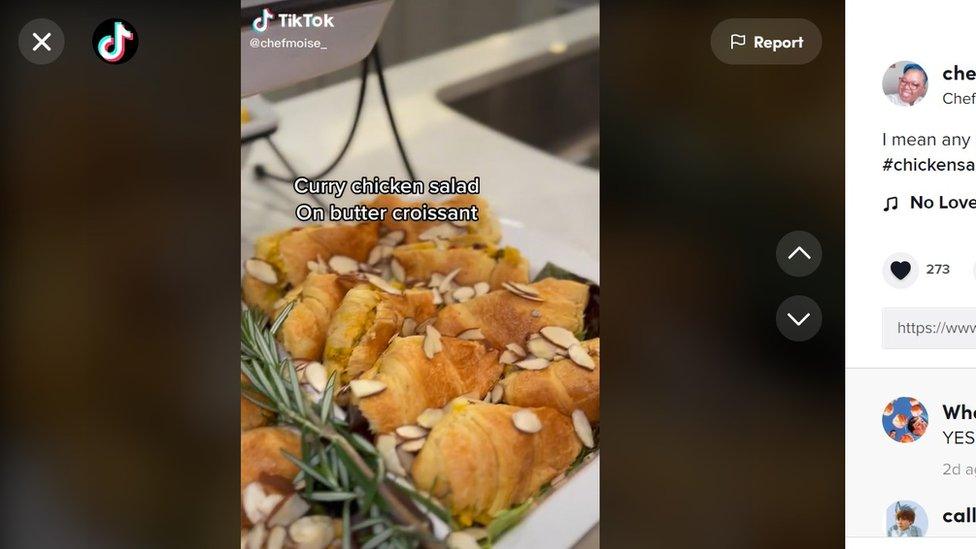
Ms Moise now has more than 558,000 followers on TikTok, who get to see videos for dishes such as this one
Thanks, in big part, to TikTok raising her profile, Ms Moise now does 12 to 14 private catering gigs per month. She also earns about $100 (£78) every four weeks as a registered "TikTok creator". This scheme sees TikTok pay registered members of its "creator fund" an amount of money per month determined mainly by the number of views their videos have received., external
Another committed foodie, Los Angeles-based chef, Brandon Skier, now has 1.9 million follows and 34.5 million likes on TikTok, from people who watch his regular cooking tutorials at his account @sad_papi., external
Like Ms Moise, he left the restaurant world when the pandemic hit, and took to uploading videos of himself on social media. He also doesn't miss his old life, where he spent 10 years working really hard in fine-dining establishments.
"I drank the [restaurant] Kool-Aid, and all I wanted to do was be a line cook, and then eventually a sous chef, and then a CDC [chef de cuisine, or head chef]," he says.
"But the further I took a step back from the restaurant industry [as a result of Covid], the more I realised how many things were just not normal. If you want to work in fine dining... you come in early and you stay until it gets done.
"It doesn't matter if you got there at nine in the morning, you're gonna' work until 2.30 a.m. when the last table goes out. And then you are making like, just $1,000 every two weeks."
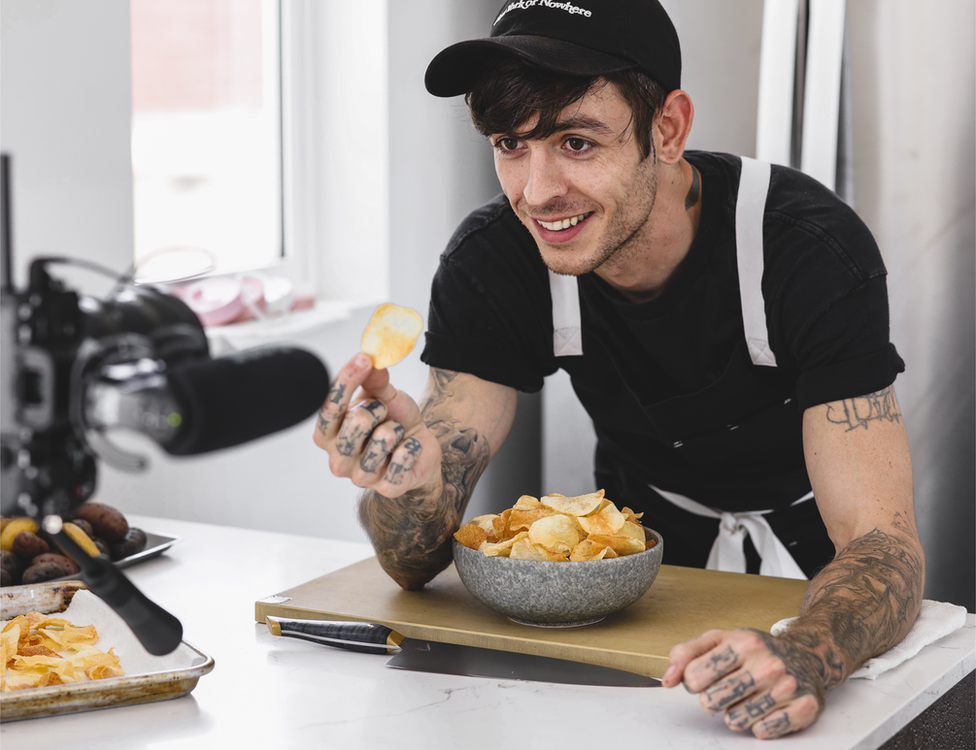
Brandon Skier secures the majority of his income from product placement deals with companies
Mr Skier, 29, says he now earns more just by sitting at home, making and uploading videos. Also a registered TikTok "creative", he says that the app pays him about $300 a month. He also earns a few hundred dollars from the videos he puts on Instagram and YouTube.
In addition Mr Skier also earns a higher income than in his old restaurant life through product placement deals with food and cooking firms. He is also making videos and developing recipes for these companies.
"The freedom is great, but the hours are still very long," he says. "Yet I think the pandemic opened a lot of doors for a lot of people.
"I think a lot of people had realisations like me, like, 'oh, there's other ways to cook and make money that don't involve being in a restaurant, that's also satisfying'."
Chef, Karen Rosenbloom has had a number of her videos go viral on Tiktok, including one that shows her making a very posh cheese and ham sandwich that has now been viewed 4.5 million times. , external
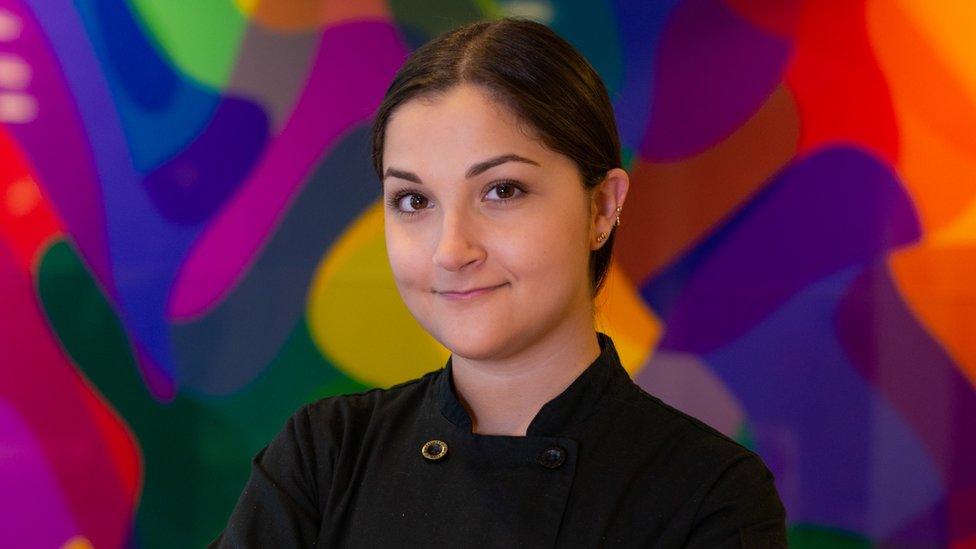
Karen Rosenbloom gets 20 requests a month for her private chef work
She may be just 21-years-old, but she has previously worked in seven professional kitchens. Like Ms Moise, Ms Rosenbloom has since the start of the pandemic been using her Tiktok account - @karens_cooking, external - to promote her work as a private chef. She has clocked-up 124,000 followers, and 3.8 million likes.
"The restaurant industry is very male-dominated," she says. "A lot of female chefs in particular turn to private chef work, because it allows them to be their own boss, and curate their own team, and their own clients, and their own menus.
"I knew that if people were interested in the recipes I was developing on TikTok, they would similarly be interested in my career as a private chef, which was new at the time. And I just started documenting days in my life."
Thanks to the success of her videos, she says she now gets up to 20 requests a month from across the US to do the catering for private events. Ms Rosenbloom, who divides her time between New York and Miami, is also getting an additional income stream from product placement deals.
She adds: "Just being a TikTok-er is not viable career… it's through brand deals and collaborations, or supporting a business that you have outside of TikTok, that you can really create a viable career and ultimately make money."
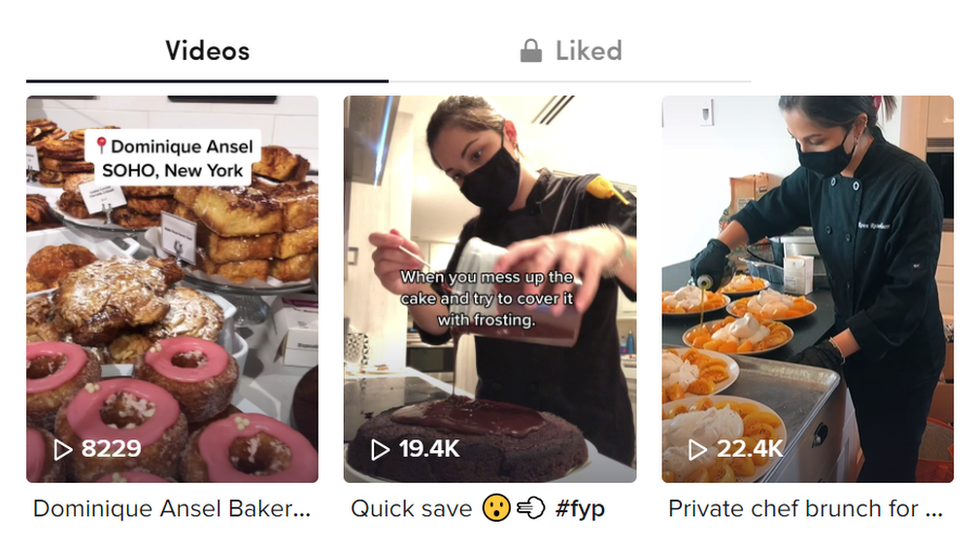
Karen Rosenbloom is continuing to build up her TikTok following
Ms Moise, Mr Skier and Ms Rosenbloom have all stressed dissatisfaction with working in restaurant kitchens as part of the reason behind shifting to TikTok to reinvent themselves as either private chefs or full-time makers of food videos.
This is a familiar story for Zoe Adjonyoh, who is director of the women's leadership program at James Beard Foundation, a non-profit organisation that campaigns to improve working conditions for kitchen and waiting staff.
She says that the restaurant sector has to confront "distressing work environments, poor benefits, and the systemic exclusion and erasure of women's voices, black voices and people of colour generally".


New Tech Economy is a series exploring how technological innovation is set to shape the new emerging economic landscape.

London-based Ms Adjonyoh adds that restaurants need good staff in order to stay open, and so working conditions have to improve. "Food is culture. If you have neighbourhoods without restaurants, what do you have?"
Back in Philadelphia, Ms Moise says she has no regrets at all about giving up restaurant kitchens.
"For one, I get to - for the first time - choose the clientele. And two, I get to control my prices. I get to say 'heh this is what I'm worth, this is what you're gonna pay me'."